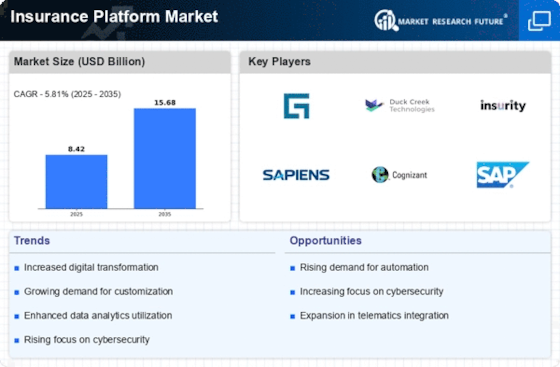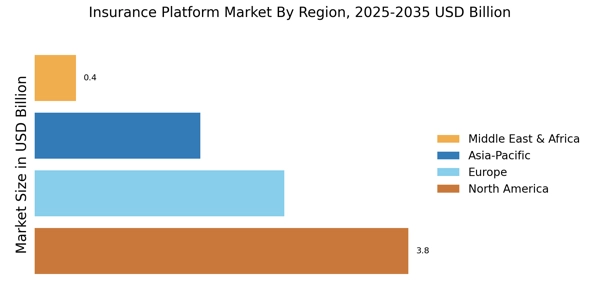Growing Importance of Data Analytics
Data analytics is becoming a cornerstone of the Insurance Platform Market, driving decision-making and strategic planning. Insurers are increasingly leveraging data to gain insights into customer behavior, risk assessment, and market trends. The ability to analyze vast amounts of data enables companies to make informed decisions, optimize pricing strategies, and enhance product offerings. Recent reports suggest that organizations utilizing advanced analytics can achieve a 15% increase in profitability. As the importance of data-driven strategies continues to rise, insurance platforms that effectively harness data analytics are likely to gain a competitive advantage in the Insurance Platform Market.
Increased Focus on Customer Experience
In the Insurance Platform Market, enhancing customer experience has emerged as a critical driver. Insurers are increasingly recognizing that a seamless and user-friendly experience can significantly influence customer retention and acquisition. Recent studies indicate that companies prioritizing customer experience can achieve up to a 20% increase in customer satisfaction scores. This focus on customer-centricity is prompting insurance platforms to invest in intuitive interfaces, efficient claims processing, and responsive customer support. As a result, organizations that successfully elevate the customer experience are likely to see improved loyalty and market share within the Insurance Platform Market.
Technological Advancements in Insurtech
The Insurance Platform Market is significantly influenced by technological advancements in insurtech. Innovations such as blockchain, artificial intelligence, and big data analytics are transforming traditional insurance models. These technologies enhance operational efficiency, reduce costs, and improve risk assessment capabilities. For instance, the integration of AI in underwriting processes can lead to a 30% reduction in processing time. As insurtech continues to evolve, insurance platforms that adopt these technologies are better positioned to meet the demands of modern consumers. Consequently, the ongoing technological evolution is likely to drive growth and innovation within the Insurance Platform Market.
Regulatory Changes and Compliance Requirements
The Insurance Platform Market is increasingly shaped by evolving regulatory changes and compliance requirements. Insurers must navigate a complex landscape of regulations aimed at protecting consumer rights and ensuring data security. Recent legislative developments have introduced stricter guidelines for data handling and privacy, compelling insurance platforms to enhance their compliance frameworks. This regulatory environment creates both challenges and opportunities for insurers. Companies that proactively adapt to these changes can not only mitigate risks but also build trust with consumers. Therefore, the ability to effectively manage regulatory compliance is likely to be a key differentiator in the Insurance Platform Market.
Rising Demand for Personalized Insurance Solutions
The Insurance Platform Market is witnessing a notable shift towards personalized insurance solutions. Consumers increasingly seek tailored products that cater to their specific needs and preferences. This trend is driven by advancements in data analytics and customer relationship management technologies, enabling insurers to offer customized policies. According to recent data, approximately 70% of consumers express a preference for personalized insurance offerings. This demand compels insurance platforms to innovate and enhance their service delivery, thereby fostering competition within the industry. As a result, companies that effectively leverage customer data to create bespoke solutions are likely to gain a competitive edge in the Insurance Platform Market.

















